- europages
- >
- COMPANIES - SUPPLIERS - SERVICE PROVIDERS
- >
- equipment for concrete
Results for
Equipment for concrete - Import export
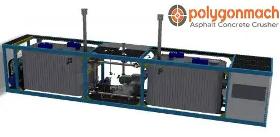
POLYGONMACH MAKINE SANAYI VE TICARET LTD STI
Turkey
A polymer modified bitumen plant is a special facility and part of the process—an essential one—in producing polymer-modified bitumen that will later be used in creating more robust asphalts for many construction applications. This process involves the addition of specific polymer additives into the bitumen for the attainment of superior performance characteristics in terms of improved durability, flexibility, and resistance to deformation. PMB is used in the construction of roads and other critical infrastructure such as airport runways, where the pavement undergoes heavy traffic, adverse weather conditions, or any other punishing environment. A Polymer Modified Bitumen Plant produces bitumen that will be stalwart enough to meet the requirements of the new, more demanding infrastructure projects. The addition of polymers to bitumen will allow the plant to come up with a product that is resistant not only to traffic pressure in high-traffic areas but also to structure wear over time.
Request for a quote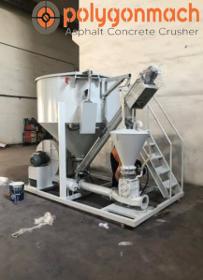
POLYGONMACH MAKINE SANAYI VE TICARET LTD STI
Turkey
The Asphalt Fiber Granule Additive System is a modern, pre-engineered component assembled in asphalt plants for the introduction of fiber granules into asphalt mix with needed precision and control. These fiber granules play a vital role in strengthening asphalts against cracking, rutting, and other distresses. Fiber granules enhance the durability and performance of asphalt pavements, allowing them to sustain increasing volumes and intensities of traffic without being affected by various harsh weather conditions. The system is critical in the manufacture of high-quality asphalt mixes qualified enough for modern infrastructure. The effect of adding fiber granules into an asphalt mix is reinforcing; much the same way rebar does in concrete. This reinforcement allows such loads to distribute further out in the pavement, minimizing the chances of damage with time.
Request for a quote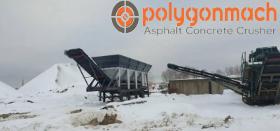
POLYGONMACH MAKINE SANAYI VE TICARET LTD STI
Turkey
What is a Mobile Aggregate Sand Gravel Dosing Bunker? The Aggregate Sand Gravel Dosing Bunker is a movable device used for storing, dosing, and transporting aggregates such as sand and gravel. This mobile facility is specifically very useful in those industries where flexibility and efficiency of material handling play a vital role, like construction, mining, and infrastructure projects. It is portable, thus easily transferrable from one site to another, making it the solution of choice in projects that need on-the-go material supply with dosing capability. This bunker system is designed to provide a convenient, on-site aggregate management facility with the minimum of fuss and maximum reliability. Be it for roadworks, concrete plants, or any process requiring the exact and repeatable dosing of materials, this machinery truly provides outstanding versatility to keep any operation running smoothly.
Request for a quote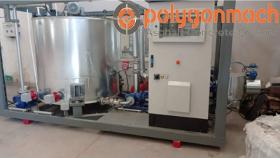
POLYGONMACH MAKINE SANAYI VE TICARET LTD STI
Turkey
Bitumen also known as asphalt is a petroleum derivative that is a black sticky and viscous liquid or semi-solid. It is mostly used to make asphalt concrete during road construction where it acts as a binder for aggregate particles. Because of its waterproofing and adhesive properties bitumen is an ideal material for constructing and maintaining roads roofs and other infrastructure. This substance is produced as a byproduct of distilling crude oil. Its strength and weather resistance make it the preferred material for paving roads and waterproofing buildings. Bitumen is used in a wide range of industries due to its many benefits which include resistance to temperature changes and long-term durability. Bitumen Emulsion To make bitumen emulsion bitumen water and extra additives are mixed together to maintain stability and performance.
Request for a quote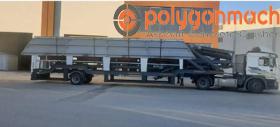
POLYGONMACH MAKINE SANAYI VE TICARET LTD STI
Turkey
A Mechanical Stabilization Plant: What Is It? In order to enhance the qualities of soil and make it more suitable for constructing infrastructure such as roads highways and airport runways the construction industry uses mechanical stabilization plants. In order to improve the strength durability and load-bearing capacity of the soil binding agents like lime cement or foamed bitumen are blended into the soil. The objective is to produce a uniform stable material that can back the building of long-lasting structures and surfaces. In situations where the native soil lacks the necessary qualities for construction mechanical stabilization plants are crucial. By modifying the properties of the soil these plants guarantee that the foundation is robust enough to support large loads and withstand environmental influences.
Request for a quote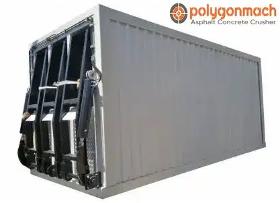
POLYGONMACH MAKINE SANAYI VE TICARET LTD STI
Turkey
What Is a Bitumen Drum Barrel Heater Decanter? In road construction, the Polygonmach Bitumen Barrel Heater Decanter is one of the important machines in the field, and hence, it is so important in the construction industry. The main work is heating and liquefaction of bitumen. Bitumen usually comes in solid or semi-solid state in standard barrels. The process makes the bitumen ready to use in various activities involving construction, mostly in building and road maintenance. This machine ensures that bitumen is in the right state for application; hence, one is assured that the expected execution and projected long-term quality and durability of a road construction job are met. The use of these heaters/decanters is hence widespread owing to how effectively they change bitumen from the stored state into the state that it can be used as a liquid.
Request for a quote
POLYGONMACH MAKINE SANAYI VE TICARET LTD STI
Turkey
Types of Aphalt Plants With its unparalleled efficiency versatility and superior asphalt mix quality Polygonmachs 140-160 TPH mobile asphalt plant raises the bar for mobile asphalt production technology and is ideal for medium- to large-scale projects. With its cutting-edge features designed to meet the exacting specifications of asphalt production and its remarkable mobility this high-capacity plant is the ideal solution for projects requiring efficient high-quality asphalt production on the go.Aggregate Industries Asphalt Plants With an emphasis on quick deployment and simple operation for a prompt start of projects Polygonmachs 140–160 TPH mobile asphalt plant is painstakingly designed to offer a seamless user experience. Owing to its exceptional mobility it can be moved quickly and easily between locations.
Request for a quote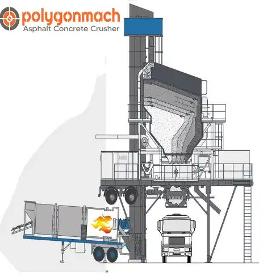
POLYGONMACH MAKINE SANAYI VE TICARET LTD STI
Turkey
Hot mix Asphalt Plant Types Hot mix asphalt plants can be configured in a variety of ways to suit the needs of different projects. The main varieties are portable mobile and stationary plants each has a special benefit depending on the size and specifications of the building projects it supports. Because of their steady setup and high production capacity stationary plants—which are fixed at a single location—are perfect for big long-term projects. On the other hand plants that are mobile or portable provide flexibility and mobility enabling them to be quickly moved to various job sites. This makes them appropriate for smaller more dynamic projects or those that need frequent site changes. This adaptability is best demonstrated by Polygonmachs mobile or portable hot mix asphalt plant. These plants are lightweight portable and quickly assemble they require little work to assemble disassemble and move.
Request for a quote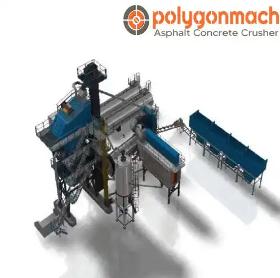
POLYGONMACH MAKINE SANAYI VE TICARET LTD STI
Turkey
Asphalt Manufacturing Facility The stationary hot mix asphalt plants from Polygonmach are not transportable instead they are fixed in one place and intended for large-scale asphalt production. With capacities ranging from 60 to 400 tonnes per hour these plants can produce asphalt continuously which makes them perfect for large-scale projects. Their main job is to combine aggregates like crushed stone sand or gravel with a binder called asphalt cement to create high-quality hot mix asphalt which is an essential material for road construction and maintenance. Asphalt Plant Near me A vital part of any asphalt plant is aggregate storage. The plant stores aggregates in sizable bins or stockpiles which include sand gravel and crushed stone. These components which make up the majority of the asphalt mix are first sorted according to size and quality before being added to the mixing process.
Request for a quote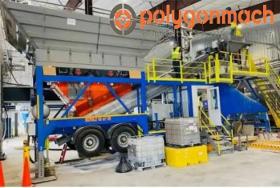
POLYGONMACH MAKINE SANAYI VE TICARET LTD STI
Turkey
3D Concrete Printer Plants are state-of-the-art, high-tech facilities designed to allow the automated building of objects by using techniques of 3D concrete printing. They come with the big robotic arms or gantry systems that lay in place special concretes layer after layer according to pre-programmed digital designs. Herein, the exact deposition of concrete material could also provide for the creation of very complex geometric shapes or intricate architectural details wherein traditional construction methods may find it very difficult to accomplish such tasks. More than that, the 3D Concrete Printer Plants being utilized nowadays greatly transform the entire concept of the construction industry by rendering increased construction speed, lessened human resource, and more sustainably built projects through reducing the waste of materials.
Request for a quote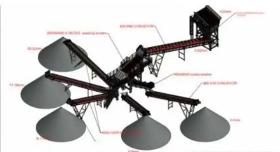
POLYGONMACH MAKINE SANAYI VE TICARET LTD STI
Turkey
Compact Sand Washing Plants are small, specifically designed plants developed for the effective cleaning and separation of sand particles in industrial applications. Most of the plants consist of a combination of equipment, including a sand washer, dewatering screen, hydrocyclones, and fine material washers, all integrated into one compact and mobile unit. Compact Sand Washing Plants are mainly designed to remove impurities, silt, and contaminants from sand to leave the final product clean, well-graded, and fit for use in construction, concrete production, and other industrial procedures. These plants integrate several washing and screening mechanisms in an integrated compact design, ensuring high effectiveness in washing and dewatering sand while guaranteeing better output quality at space and operationally lower footprints.
Request for a quote
POLYGONMACH MAKINE SANAYI VE TICARET LTD STI
Turkey
Filter press systems are equipment used in separating solids from liquids in various industrial processes. The system includes a series of filter plates arranged in a stack within a filter press unit. The plates are normally covered with filter cloth or filter medium that will allow the liquid component to pass through while holding back solid particles. During the process of filtration, a slurry or suspension is typically pumped into a filter press, where pressure is applied that squeezes the liquid component through the filter media, leaving solid particles trapped within the filter cakes. Afterwards, these cake solids are discharged from the filter plates, and the clarified liquid is discharged at the end of a filtration process to have efficient separation and dewatering of the solids from the liquid phase. Filter Press Systems find their application in a wide array of industries, such as chemical processing, wastewater treatment
Request for a quote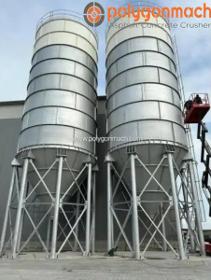
POLYGONMACH MAKINE SANAYI VE TICARET LTD STI
Turkey
A Bolted Segment Kitset Cement Silo and Mineral Silo is a certain form of storage specially meant for bulk materials such as cement, fly ash, lime, and a variety of mineral types. The silos are made out of bolted segments that are prefabricated metal panels assembled at a site to form a robust and durable storage unit. The silo design allows for easy transportation, assembly within the shortest time possible, and also has capacity flexibility. Hence, these silos, due to their ease of transport, quick assembly, and flexibility in capacity, are ideal for many industrial applications. The kitset design enables the silo parts to be delivered for easier transportation to remote locations or sites with poor access. Bolted segment silos are widely employed in construction industries, mining operations, and manufacturing plants because of their versatile and reliable nature.
Request for a quote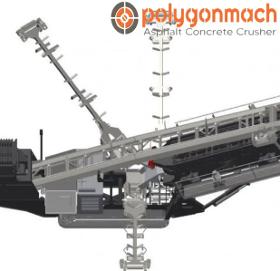
POLYGONMACH MAKINE SANAYI VE TICARET LTD STI
Turkey
Introducing Our Advanced Track Mounted Screen Plant Our advanced track mounted screen plant is designed to deliver exceptional performance in various screening applications. Featuring three triple screen decks with a screen size of 5,200 x 1,870 mm, it ensures optimal material separation and high productivity. The plant weighs 36,500 kg, reflecting its robust construction. Driven by a hybrid system with motors from Perkins, Cummins, or Volvo, it offers the flexibility of operating on electricity or diesel. The screen angle is adjustable between 12-18 degrees, allowing for versatile screening tasks tailored to different materials and project requirements. High-Performance Triple Screen Decks The triple screen decks of our track mounted screen plant provide superior screening capabilities, handling large volumes of material with ease. Each deck is meticulously designed to ensure efficient and accurate separation, enhancing overall productivity.
Request for a quote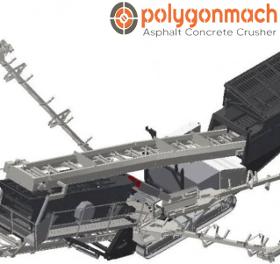
POLYGONMACH MAKINE SANAYI VE TICARET LTD STI
Turkey
Technical Specifications of Our Track Cone Crusher: MODEL PTC300 Our track cone crusher, MODEL PTC300, stands out for its powerful performance and advanced features, making it an essential asset in various crushing applications. The crusher is equipped with the HP300 METSO cone model, featuring a head diameter of 1,120 mm (44") and a power output of 220 kW (300 hp). This robust construction is designed to deliver exceptional crushing capabilities. With a complete crusher weight of 18,100 kg (39,900 lbs) and a feed opening of 241 mm (9 1/2"), the PTC300 ensures efficient material handling and processing. High Capacity and Efficient Performance The track cone crusher, MODEL PTC300, is engineered for high capacity and efficient performance. It boasts a maximum capacity of 440 Mtph (485 Stph), making it ideal for large-scale crushing projects. The crusher can handle a maximum feed size of 47 - 250 mm, allowing it to process a wide range of materials effectively.
Request for a quote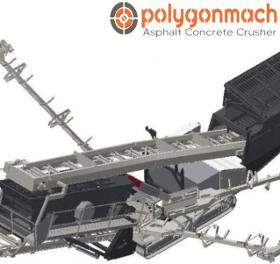
POLYGONMACH MAKINE SANAYI VE TICARET LTD STI
Turkey
PTV700 Model: A High-Performance Vertical Shaft Impact Crusher Introducing the PTV700 Vertical Shaft Impact Crusher, a cutting-edge model engineered for high efficiency and optimal performance in crushing operations. This advanced crusher is ideal for applications requiring finely crushed aggregate, making it a versatile tool in sand making and mineral processing. With its impressive technical specifications, the PTV700 sets new standards in crushing technology. Featuring a closed rotor type, this crusher ensures precise material processing and delivers uniform and high-quality output. Its robust construction and advanced features make it a reliable and effective solution for modern crushing requirements. Rotor Type and Feed Size The PTV700 is equipped with a closed rotor type, designed to enhance material flow and improve crushing efficiency. The closed rotor ensures that material is processed consistently, resulting in high-quality, uniform aggregate output.
Request for a quote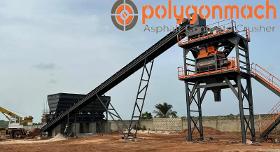
POLYGONMACH MAKINE SANAYI VE TICARET LTD STI
Turkey
A stationary concrete batching plant of 120 m³/h is a construction facility that helps in producing high quantities of concrete, i.e. 120 cubic meters, each hour from the output. It is a plant used in large construction sites or just about any site that requires huge levels of concrete output within a short timeline. It brings together the following raw materials: cement, aggregates, water, and additives in designed proportions in order to produce high-quality concrete mixes that will meet respective specification requirements for construction. With the inclusion of equipment such as a set of cement silos, aggregate bins, a cement mixer, and a control system for a 120 cum/hour production unit, we ensure that continuous production of concrete meets the demand that is usually experienced in large construction projects. These include the cement silo, aggregate bins, and control system
Request for a quoteDo you sell or make similar products?
Sign up to europages and have your products listed
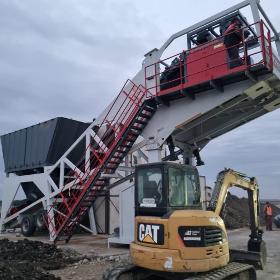
POLYGONMACH MAKINE SANAYI VE TICARET LTD STI
Turkey
A 30m3/hour mobile portable concrete batching plant is a compact, versatile facility of concrete production designed to be truly mobile and flexible. This type of plant, which has the feature of producing 30 cubic meters of materials in an hourly cycle, aims to serve small- or medium-scale construction with different scales of needs. The portable mobile design ensures that it can easily be transferred from one place to another, enabling on-site production and delivery for the best service possible on any given project. As much as it is compact and mobile, the 30m3/hour mobile portable concrete batching plant is quickly and effectively erected, ensuring minimum downtime on those construction sites choked by space or found in remote areas. These mean portable plants can have most of the essential components, which could include storage bins for aggregates, cement silos, mixer unit, and a control system to regulate the batching and mixing processes.
Request for a quote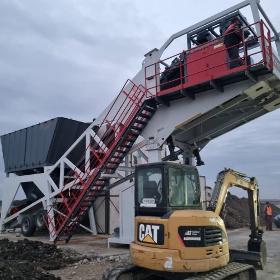
POLYGONMACH MAKINE SANAYI VE TICARET LTD STI
Turkey
A 30m3/hour mobile portable concrete batching plant is a compact, versatile facility of concrete production designed to be truly mobile and flexible. This type of plant, which has the feature of producing 30 cubic meters of materials in an hourly cycle, aims to serve small- or medium-scale construction with different scales of needs. The portable mobile design ensures that it can easily be transferred from one place to another, enabling on-site production and delivery for the best service possible on any given project. As much as it is compact and mobile, the 30m3/hour mobile portable concrete batching plant is quickly and effectively erected, ensuring minimum downtime on those construction sites choked by space or found in remote areas. These mean portable plants can have most of the essential components, which could include storage bins for aggregates, cement silos, mixer unit, and a control system to regulate the batching and mixing processes.
Request for a quote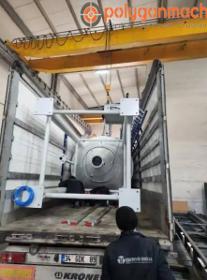
POLYGONMACH MAKINE SANAYI VE TICARET LTD STI
Turkey
An 80-ton welded-type cement silo is a large storage container designed mainly to hold big amounts of cement in construction and industrial settings. The metal panels used to build this type of silo are joined by welding so that they are very strong and sturdy, thereby enabling them to hold big volumes of cement. These silos can hold 80 tons of cement, ensuring a large storage and continuous, effective supply of this required construction material at the working site or the cement manufacturing plant. Leakages and structural failures, caused by poor welding, are eliminated by the welded feature in the 80-ton cement silo; thus, the quality of the cement stored is maintained. It has access doors, level indicators, and discharge systems which make the process of loading-unloading of cement easy.
Request for a quote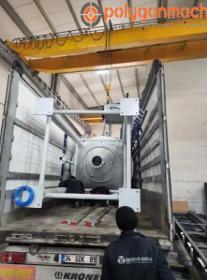
POLYGONMACH MAKINE SANAYI VE TICARET LTD STI
Turkey
A 60 tons welded type cement silo is a big storage container integrated to execute the specialty of maintaining and producing a large amount of bulk cement. Mainly, these are integrated at construction sites and concrete manufacturing plants to ensure the appropriate and continuous supply of cement in various types of building projects. Mostly made up of steel, welded, and cylindrically shaped with a bottom cone, the cement silos are strong and well-built to bear the weight and pressure exerted by the stored cement. These 60-ton welded-type cement silos are best used for cement storage in huge quantities, and at the same time, the controlled gauge pre-fabrication of cement is needed when producing concrete. This makes it possible to store huge amounts of cement—60 tons—which in turn lowers the frequency of refills and optimizes the logistics cost of cement transportation. Silos are welded on the structural integrity and to minimize insemination and contamination chances.
Request for a quote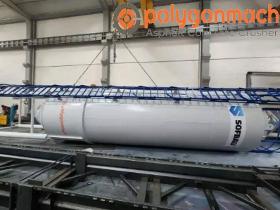
POLYGONMACH MAKINE SANAYI VE TICARET LTD STI
Turkey
A 100 tons Welded Type Cement Silo is a large vessel designed for storing cement in bulk. This silo type is fabricated from welded steel sheets that provide strength and durability to the vessel, allowing it to bear the weight of the stored material and act against the external environment. Its substantial storage capacity, reaching 100 tons, enables it to handle and distribute cement effectively in many industrial and construction environments. Operational, a 100 tons Welded Type Cement Silo receives cement through pneumatic conveying systems or another loading mechanism into the silo. The cement then settles down at the bottom of the silo, consuming the available storage. In applications that require cement for production or construction, the silo's discharge system, usually screw conveyors or airslide mechanisms, provides controlled withdrawal from the bottom. This will ensure a constant supply of cement while keeping famous issues like clogging or material bridging to a minimum.
Request for a quote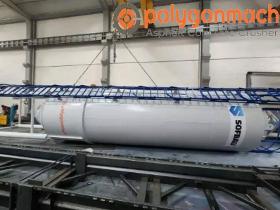
POLYGONMACH MAKINE SANAYI VE TICARET LTD STI
Turkey
A 75-ton welded type cement silo is a huge storage container used in the construction industry for the storage of cement. The silo is composed of panels of welded metal to give it strength and durability in storing large amounts of cement. Here we present the silo with a capacity of 75 tons, providing great storage capacity for cement. Without it, the supply of this critical building material would be very effectively managed on construction sites. The welded construction of the silo not only lends stability to it but also precludes any leakage, thus maintaining the quality of the stored cement inside. This makes the 75-ton welded type cement silo a strong and trustworthy storage facility that forms a key part of building works to ensure continuity in cement supplies for various building projects.
Request for a quote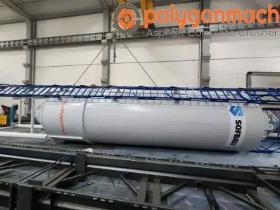
POLYGONMACH MAKINE SANAYI VE TICARET LTD STI
Turkey
The 50-ton welded type cement silo could potentially be a very large structure for concrete, cement. Those are usually applied and used at construct lines, concrete batch plants, and other industrial projects to store in addition to dispensing such objects. All-welded constancy in design guarantees their permanence and stability in long-term use with different ambient environments. The 50-ton capacity of the silo means the ability to provide a quantity that is possible to be on site well ahead of time to have the requirements of the construction met without delay. Even though the design is welded, the strength it gives is considerable enough for resisting harsh weather and, most importantly, ensures the cements stored therein are maintained safe and ready for fitting at desired times. To sum up, a 50-ton Welded Type Cement Silo- a ready and perfect solution for the storage of cement in required quantities for an ongoing construction project.
Request for a quote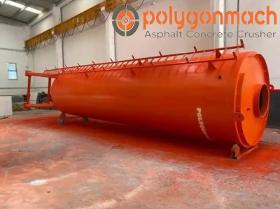
POLYGONMACH MAKINE SANAYI VE TICARET LTD STI
Turkey
A 120-ton Welded Type Cement Silo is a giant container in the shape of cylinder uprightness; it is used in holding cement basically in huge bulk quantities. These are developed out of very steel plates with the welded type, which gives the necessary robustness and strength with respect to the stored material weight on it. The welded design ensures that the silo is air and water-tight, preventing moisture and foreign materials from affecting the quality of the cement. Such silos are typically used in construction projects, where an uninterrupted and reliable supply of the material is to be maintained at all times. Large capacity of 120 tons eases bulk storage of huge quantities of cement at construction sites, eliminating multiple deliveries and hence sustaining an uninterrupted work process. Welded construction further eases their means of installation and maintenance; hence, the silos are best in their simplest and least costly form to meet cement storage needs.
Request for a quote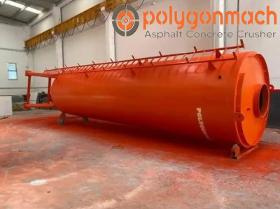
POLYGONMACH MAKINE SANAYI VE TICARET LTD STI
Turkey
A 30-ton Welded Type Cement Silo refers to the used specialized storage structure to hold a large quantity of cement in a welded construction. These silos are mainly applied in construction projects, concrete production plants, and industrial projects by which efficient storage and supply of cement are highly required. The welded-type silo design involves welding together the component parts into a robust, seamless storage unit that can bear the weight and pressure of bulk cement. These silos are designed to have a capacity of 30 tons, providing medium storage volume for medium-scale projects that require both a continuous and reliable supply of cement. The application demands regarding cement storing and dispensing are served by a 30-ton welded type cement silo. The welds guarantee the structural integrity of the silo, providing a safe environment for the stored cement.
Request for a quote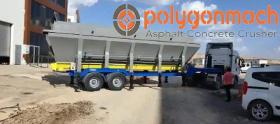
POLYGONMACH MAKINE SANAYI VE TICARET LTD STI
Turkey
A 100 tons horizontal type cement silo is a type of a structure constructed for holding a larger amount of cement in a horizontal way. These kinds of silos are used in construction work, concrete production plants, and a few other industrial applications that require storing large quantities of cement. The 100-ton capacity provides ample storage space for cement, ensuring that a constant and sufficient supply is maintained for construction. This silo has a horizontal layout, and within the small space it occupies, it serves its loading and offloading operation with a lot of ease. Considered to have such a big capacity, the Horizontal Type Cement Silo stands at 100 tons, since that is what the most silos available in the market are offering.
Request for a quote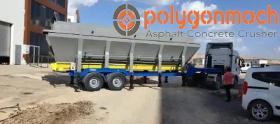
POLYGONMACH MAKINE SANAYI VE TICARET LTD STI
Turkey
A 60-ton Horizontal Type Cement Silo is a structure wherein a reasonably substantial amount of cement can be stored in a position that is horizontal with the help of the structure. It is very usual as silos in a majority of construction projects and concrete batching plants for efficient storage and transference of bulk cement. With the raised capacity of up to 60 tons, the cement storage of huge amounts is guaranteed as may be needed to meet the surging demand in various construction uses. Being horizontally structured, the 60-ton silo shares similar properties of easy mobility and installation and access in the construction sites to the top silos, and thus serves at enhancing the job site workflow and operational efficiency. The silos are usually fitted with a conveying system that allows the controlled discharge of cement according to the requirements of a construction.
Request for a quote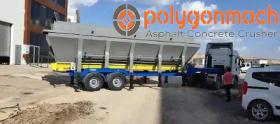
POLYGONMACH MAKINE SANAYI VE TICARET LTD STI
Turkey
A 50-ton horizontal type cement silo is generally a storage structure implemented in construction projects for storing and distributing cement. Unlike the traditional vertical silos that stand tall, horizontal silos are laid out horizontally; hence, it becomes quite easy to transport and commission on a construction site. These silos can be easily mounted on a trailer for easy movement and then securely placed on the ground for usage. Conveying systems are put in place to pump the cement out if need be, providing continuous supply of cement during construction activities. The 50-ton capacity assures carriage of enough cement at one time, thus guaranteeing continual work without constantly refilling. Convenience, efficiency, and reliable storage for construction projects characterize this size of a horizontal type cement silo.
Request for a quoteResults for
Equipment for concrete - Import exportNumber of results
235 ProductsCountries
Company type